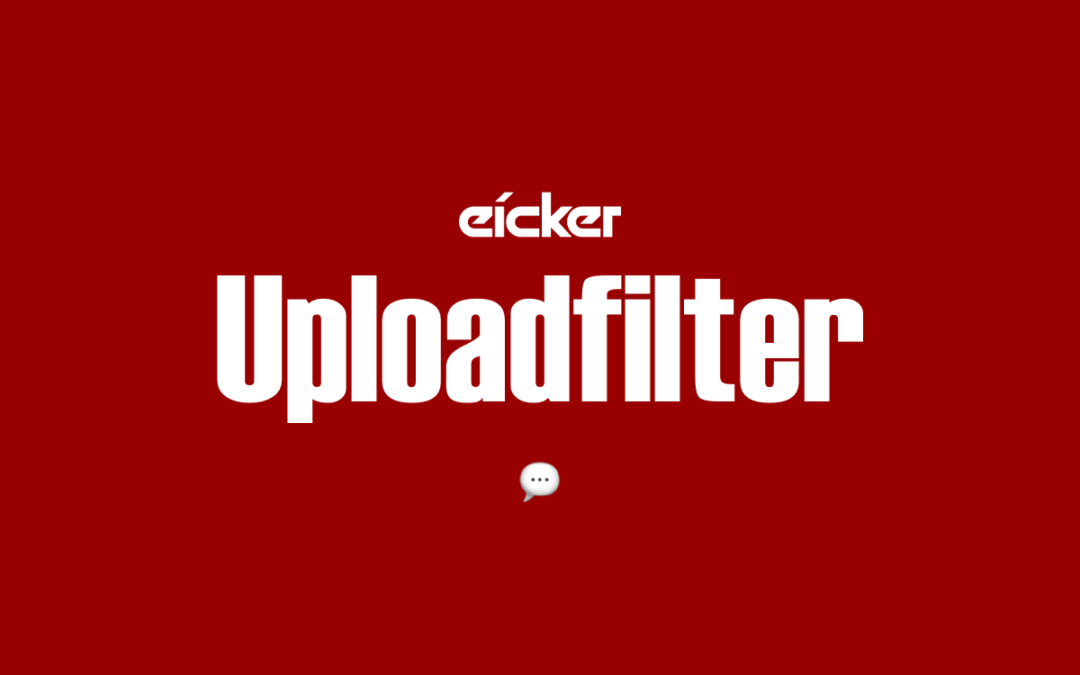eicker.TV gibt es als Vlog auf YouTube, TikTok, Instagram und zusätzlich als Podcast auf SoundCloud: Der Podcast kann bei Apple, Google, Spotify und über viele weitere Podcastclients abonniert werden.
Uploadfilter kommen doch
„So will Justizministerin Lambrecht das Uploadfilter-Problem lösen – Die Debatte um Uploadfilter etwa auf YouTube hatte die EU-Urheberrechtsreform dominiert. Jetzt liegt der Entwurf zur Umsetzung vor. Was das für Nutzer, Urheber, Rechteinhaber und Plattformen bedeutet. – Der strittigste Punkt der EU-Urheberrechtsreform im vergangenen Jahr war der Artikel 13, der letztlich zum Artikel 17 wurde: jene Regelung, die Gegner als Pflicht zur Einführung von Uploadfiltern auf Onlineplattformen betrachteten, obwohl der Begriff darin gar nicht auftaucht. … Die Plattformen müssen dem Entwurf zufolge vor jedem Upload ein ‚pre-flagging‘ anbieten: Wer etwas hochladen will, kann angeben, dass er oder sie sich auf eine erlaubte Nutzung beruft… Ausnahme: Handelt es sich bei der Datei zu mehr als 90 Prozent um einen vom Rechteinhaber gemeldetes Werk, soll das als offenkundig rechtswidriger Upload betrachtet und verhindert werden. Womit spätestens an dieser Stelle klar ist: Der Entwurf würde Uploadfilter nicht grundsätzlich verhindern.“
Spiegel
„Zweites Gesetz zur Anpassung des Urheberrechts an die Erfordernisse des digitalen Binnenmarktes – Das Bundesministerium der Justiz und für Verbraucherschutz hat am 24. Juni 2020 einen Diskussionsentwurf für ein Zweites Gesetz zur Anpassung des Urheberrechts an die Erfordernisse des digitalen Binnenmarkts veröffentlicht. … Der Entwurf führt mit Bestimmungen über die Verantwortlichkeit von Upload-Plattformen sowie Regelungen über kollektive Lizenzen mit erweiterter Wirkung zwei neue Rechtsinstrumente in das deutsche Urheberrecht ein. Zudem enthält der Entwurf Anpassungen im Urhebervertragsrecht. Der Entwurf enthält damit Vorschläge für die Umsetzung des verbleibenden Regelungsprogramms der Richtlinie über das Urheberrecht im Digitalen Binnenmarkt (EU) 2019/790. Der Entwurf setzt zugleich die Online-SatCab-Richtlinie (EU) 2019/789 um, mit der der grenzüberschreitende Zugang der europäischen Zivilgesellschaft zu Rundfunkinhalten verbessert wird. Darüber hinaus enthält der Entwurf zahlreiche weitere Änderungen; u.a. eine neue gesetzliche Erlaubnis für Karikaturen, Parodien und Pastiches.“
BMJV
Apple Werbung: Tracking-Opt-in
„Apple Just Crippled IDFA, Sending An $80 Billion Industry Into Upheaval – That tremor in the Force you felt yesterday probably wasn’t shock at being able to text your car keys in Apple’s new iOS 14 or do real-time offline translation with Siri. Instead, it was Apple’s shot across the bow of an $80 billion industry. … Yesterday Apple announced iOS 14, its new mobile operating system for iPhones and iPads. The company did not announce, as mobile marketers expected, the death of the IDFA. – Instead, Apple rendered the Identifier for Advertisers basically useless without actually killing it.“
Forbes
This Was Apple’s Most Significant WWDC Announcement. Why It’s Bad News for Google and Facebook – Developers will have to disclose exactly what information their apps collect about users. … A little more than halfway through, Apple was describing its commitment to user privacy, when it revealed that it will now require developers to disclose the information they use to track you for digital advertising purposes. … According to Katie Skinner, Apple’s manager of user privacy software, developers will have to detail exactly what information their app collects, and ‚if they’re sharing data with other companies to track you.‘ – Never once were their names mentioned, but make no mistake, those ‚other companies‘ are Google and Facebook. In fact, Apple took several thinly veiled swipes at Google, in particular, like when it described how browsers (like Google’s Chrome) handle extensions and the privacy concerns associated with them.“
Inc.
18 Monate: Google Search History
„Google will now auto-delete location and search history by default for new users – A compromise between privacy and ad-targeting data – On Wednesday, Google announced broad changes in its default data practices for new users, including a significant expansion in the company’s willingness to automatically delete data. … Google’s auto-delete feature applies to search history (on web or in-app), location history, and voice commands collected through the Google Assistant or devices like Google Home. Google logs that data in its My Activity page, where users can see what data points have been collected and manually delete specific items. … Starting today, those settings will be on by default for new users. Google will set web and app searches to auto-delete after 18 months even if users take no action at all. Google’s location history is off by default, but when users turn it on, it will also default to an 18-month deletion schedule. – The new defaults will only apply to new users, and existing Google accounts won’t see any settings change. However, Google will also be promoting the option on the search page and on YouTube in an effort to drive more users to examine their auto-delete settings. Auto-delete can be turned on from the Activity Controls page.“
The Verge
Slack Connect: 20 in einem Kanal
„Slack Connect lets up to 20 organizations chat in one channel – Slack today announced the launch of Connect, a way for up to 20 organizations to communicate in a single Slack channel. Slack CEO Stewart Butterfield said Connect has been under development for four years. Slack Connect is rolling out for paying customers now, and may be made available in some capacity for the unpaid tier of Slack in the future. Channels are a central part of the Slack experience and are intended to bring people together to chat, share files, and do other things for a particular project or topic.“
VentureBeat
